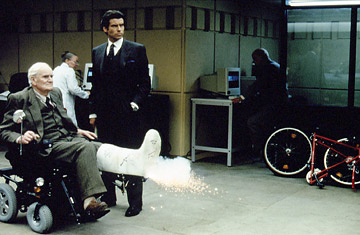
Desmond Llewelyn plays 'Q' opposite Pierce Brosnan's James Bond in "Goldeneye"
"If it hadn't been for Q Branch," the secret service gadget master known simply as Q tells James Bond in 1989's License to Kill, "you'd have been dead long ago." As the fatherly boffin responsible for arming and protecting the British spy since the early 1960s, Q has tinkered with super cars (Bond's amphibious Lotus in The Spy Who Loved Me which came with torpedoes and mines), invented cunning weapons (a key chain in The Living Daylights that used gas to disorientate the enemy, followed by an explosive charge) and regularly came up with ingenious tools (a fake fingerprint in Diamonds Are Forever, a glass-shattering ring in Die Another Day) to get Bond out of tight spots.
Q may have retired — he hasn't appeared in the last couple of Bond films — but science and technology are still vital to security. That's why MI5, Britain's domestic security service, is currently advertising for a kind of real-life Q. The new "chief scientific adviser", an ad posted on the agency's website says, should boast "world-class scientific expertise" and "outstanding influencing and communication skills" in order "that the service continues to be supported by excellent science and technology advice." (See pictures of James Bond foiling villains.)
If the past few years are anything to go by, the successful candidate will help MI5 grapple with terrorism, work to stymie the proliferation of weapons of mass destruction and sharpen its surveillance and counter-intelligence efforts. "There's an enormous amount of scientific content in this role," Professor John Beddington, the government's chief scientific adviser, told the BBC. On top of that, "it will involve a sort of future gazing to see where technology will be taking us in a year or so."
Needless to say, neither MI5, nor the Home Office, the government department that handles inquiries about the stealth agency, is eager to share the specifics of the role. The document detailing the job, circulated by Egon Zehnder International, a London-based headhunting firm, doesn't go beyond the vaguest of descriptions. The successful candidate will be responsible for "developing and owning a clear science, technology and innovation strategy for the Security Service", it reads, and "ensuring that [science] ... is soundly based."
Not that we'll probably ever know. Successful new inventions are unlikely to appear in shops anytime soon, lest friends and foes alike get hold of the technological wizardry. "Whether or not we'll ever get to see any of this [technology], that's a different matter," says Julia Wing, director of Spymaster, a London-based supplier of clever surveillance and communications tech to British government departments. (See pictures of Ian Fleming.)
The tricky nature of the job means a fellow of the Royal Society, Britain's independent scientific academy, or its Royal Academy of Engineers, is most likely to fill the position, the headhunter's document suggests.
Aspiring Qs would do well to think outside the box. Played most famously by Welshman Desmond Llewelyn, the fictional Q was nothing if not a dreamer. Yet not everything the Bond technician dreamt up became standard issue. 007 never did get to try out the couch, showcased in The Living Daylights, that swallowed up anyone who sat on it. The spy also managed without the telephone box equipped with air bags able to crush anyone inside it. And we never heard a sound out of the exploding alarm clock — "guaranteed," Q said in License to Kill, "never to wake up anyone who uses it." But it was the thinking behind all those cool gadgets that counts.
See TIME's celebration of Ian Fleming's centenary and James Bond.
